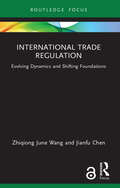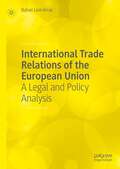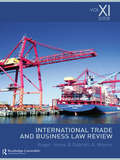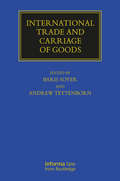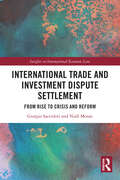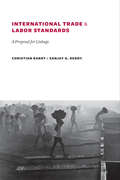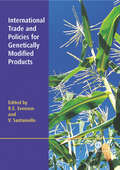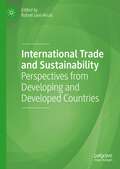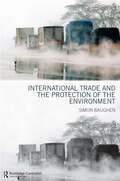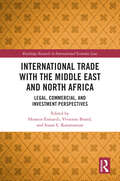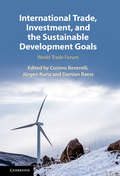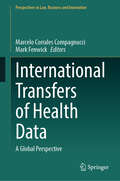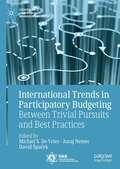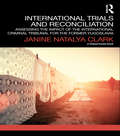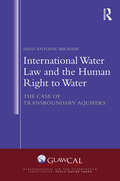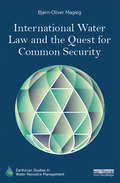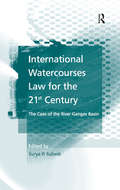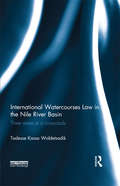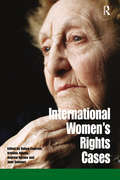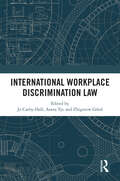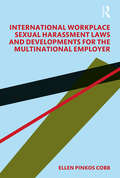- Table View
- List View
International Trade Regulation: Evolving Dynamics and Shifting Foundations (Routledge Research in International Economic Law)
by Zhiqiong June Wang Jianfu ChenThe international trade regulatory system is a dynamic system that has been evolving throughout its history. Tension and conflict are part of the system. While calls for the abolition of the principal trade regulation authority, the WTO, have failed to understand this nature of the system, proponents for reforms have so far not paid sufficient attention to the evolving nature of tension and conflict. This book examines the evolving dynamics in international trade regulation from the conclusion of GATT in 1947 to the current crisis facing the WTO, from a perspective of emerging powers of developing countries with a focus of China as the latest force that demands reforms of the international trade regulatory regime. There is an extensive body of scholarship on ideological struggles, the rise of developing countries, geopolitical contest, the emerging powers (especially China), the use, misuse or abuse of trading rules and so on. There is, however, a lack of a single concise research book that synthesises these underlying causes and factors into a coherent and precise analytical theme. This book attempts to fill this research gap by building upon the existing scholarship and placing the various tensions and conflicts in a perspective that treats them as dynamic factors that have propelled a continuing process of evolution of the international trade regulation. The book will interest those researching on international trade regulation as well as development studies.
International Trade Relations of the European Union: A Legal and Policy Analysis
by Rafael Leal-ArcasThis book examines the need for greater legal coherence within international trade negotiations between the European Union (EU) and external trade relations. An introspective analysis of EU trade law and policy is presented that highlights the complex issue of EU unity. A particular focus is given to the Doha Round and the General Agreement on Trade in Services, with empirical analysis placing the negotiations not just within the context of international trade law, but also within broader social and political contexts. This book aims to provide an interdisciplinary understanding of the EU’s international trade negotiations. It will be relevant to researchers and policy-makers interested in international trade and EU law.
International Trade and Business Law Review: Volume VIII
by Gabriel MoensFirst published in 2003. Routledge is an imprint of Taylor & Francis, an informa company.
International Trade and Business Law Review: Volume X
by Roger Jones Gabriël A. MoensThe International Trade and Business Law Review publishes leading articles, comments and case notes, as well as book reviews dealing with international trade and business law, arbitration law, foreign law and comparative law. It provides the legal and business communities with information, knowledge and understanding of recent developments in international trade, business and international commercial arbitration. The Review contributes in a scholarly way to the discussion of these developments while being informative and having practical relevance to business people and lawyers. The Review also devotes a section to the Willem C. Vis International Commercial Arbitration Moot and publishes the memoranda prepared by teams coached by Professor Gabriël A. Moens. The Review is edited at the Murdoch University School of Law in Perth, Australia. The Editors-in-Chief are Mr Roger Jones, Partner, Latham & Watkins LLP, Chicago and Gabriël A. Moens, Dean and Professor of Law, Murdoch Law School. It is an internationally-refereed journal. The Review is supervised by an international board of editors that consists of leading international trade law practitioners and academics from the European Union, the United States, Asia and Australia. The Student Editors for Volume XII are Sybil Almeida, Gianni Bei, Luke Rotondella, and Nicholas Summers from the Murdoch Law School.
International Trade and Business Law Review: Volume X
by Roger Jones Gabriël A. MoensCompiled by leading international trade law practitioners and academics from across the globe, this volume provides legal and business communities with information, knowledge and an understanding of recent developments in international trade, business and international commercial arbitration. Scholarly in style, this volume contributes to the discussions surrounding the developments whilst being informative and of practical use to the business community and lawyers. Covering the areas of international trade and business law, arbitration law, foreign law and comparative law, with one section devoted to the Willem C. Vis International Commercial Arbitration Moot, it contains: leading articles comments case notes book reviews. International Trade and Business Law Review is an invaluable resource for post-graduate students and business and legal professionals, primarily studying and working in the UK, USA and Australia.
International Trade and Business Law Review: Volume X
by Roger Jones Gabriël A. MoensThe International Trade and Business Law Review publishes leading articles, comments and case notes, as well as book reviews dealing with international trade and business law, arbitration law, foreign law and comparative law. It provides the legal and business communities with information, knowledge and understanding of recent developments in international trade, business and international commercial arbitration. The Review contributes in a scholarly way to the discussion of these developments while being informative and having practical relevance to business people and lawyers. It also devotes a section to the Willem C. Vis International Commercial Arbitration Moot and publishes the memoranda prepared by teams coached by Professor Gabriël A. Moens. The Review is edited at the Murdoch University School of Law in Perth, Australia. The Editors-in-Chief are Mr Roger Jones, Partner, Latham & Watkins LLP, Chicago and Gabriël A. Moens, Dean and Professor of Law, Murdoch Law School. It is an internationally-refereed journal. The Review is supervised by an international board of editors that consists of leading international trade law practitioners and academics from the European Union, the United States, Asia and Australia. The Student Editors for Volume XI are Adam Totaro and Peter Clay from the Murdoch Law School.
International Trade and Carriage of Goods (Maritime and Transport Law Library)
by Baris Soyer Andrew TettenbornThis book consists of edited versions of the papers delivered at the Institute of International Shipping and Trade Law’s 11th International Colloquium, held at Swansea Law School in September 2015. Featuring a team of contributors at the top of their profession, both in practice and academia, these papers have been carefully co-ordinated so as to ensure to give the reader a first class insight into the issues surrounding international sale and carriage contracts. <P><P>The book is set out in three parts: <P><P>Part I offers a detailed and critical analysis on emerging issues and unresolved questions in international sales and the carriage contracts affected to facilitate such sales. <P><P>Part II critically and thoroughly analyses the legal issues that often arise in the context of security over goods, letters of credit and similar documents. <P><P>Part III is dedicated to a critical and up-to-date discussion on matters concerning cargo insurance in this context. <P><P>With its breadth of coverage and high-quality analysis, this book is vital reading for both professional and academic readers with an interest in international trade and carriage of goods.
International Trade and Investment Dispute Settlement: From Rise to Crisis and Reform (Insights on International Economic Law)
by Giorgio Sacerdoti Niall MoranThis book provides a thorough comparative analysis of the trade dispute settlement system of the WTO, Regional Trade Agreements, and of Investor–State Dispute Settlement (ISDS).Reviewing in parallel their origins, features, development, and current challenges, highlighting commonalities and differences, the book analyzes criticisms leveled against both regimes, explores current reform efforts at the WTO, ICSID, and UNCITRAL (including the controversial proposal to replace ISDS with a Multilateral Investment Court), and engages in the on-going debate by evaluating possible outcomes. As to trade, the book highlights the WTO system's successful operation for more than 20 years and its hobbling functioning since the paralysis of the Appellate Body in 2019. As to ISDS, the book details the procedural protection granted to foreign investors under Bilateral Investment Treaties (BITs), other International Investment Agreements and investment chapters of trade agreements such as NAFTA, USMCA, CETA, and the CPTPP, alongside the impact of case law on the regulatory space of states.This authoritative book intends to serve as a fundamental reference for students and researchers in international investment and trade law, as well as for international lawyers, adjudicators, and diplomats involved in dispute settlement.
International Trade and Labor Standards: A Proposal for Linkage
by Sanjay G. Reddy Christian BarryIn this book, Christian Barry and Sanjay G. Reddy propose ways in which the international trading system can support poor countries in promoting the well-being of their peoples. Reforms to the trading system can lessen the collective-action problem among poor countries, increasing their freedom to pursue policy that better serves the interests of their people.
International Trade and Labor Standards: A Proposal for Linkage
by Christian Barry Sanjay ReddyProgressive governments in poor countries fear that if they undertake measures to enhance real wages and working conditions, rising labor costs would cause wealthier countries to import from and invest elsewhere. Yet if the world trading system were designed to facilitate or even reward measures to promote labor standards, poor countries could undertake them without fear.In this book, Christian Barry and Sanjay G. Reddy propose ways in which the international trading system can support poor countries in promoting the well-being of their peoples. Reforms to the trading system can lessen the collective-action problem among poor countries, increasing their freedom to pursue policy that better serves the interests of their people. Incorporating the right kind of linkage between trading opportunities and the promotion of labor standards could empower countries, allowing them greater effective sovereignty and enabling them to improve the circumstances of the less advantaged. Barry and Reddy demonstrate how linkage can be made acceptable to all players, and they carefully defend these ideas against those who might initially disagree. Their volume is accessible to general readers but draws on sophisticated economic and philosophical arguments and includes responses from leading labor activists, economists, and philosophers, including Kyle Bagwell, Robert Goodin, Rohini Hensman, and Roberto Mangabeira Unger.
International Trade and Policies for Genetically Modified Products
by Vittorio Santaniello Robert E. EvensonThere are a number of controversial issues that surround agricultural biotechnology and genetically modified products. International trade and policies are at the forefront of these controversies. This book addresses these issues and has been developed from a meeting of the International Consortium on Agricultural Biotechnology Research, held in Revello, Italy, in July 2004. It covers five themes: analytical studies, empirical trade studies, spillover dimensions, intellectual property rights and applied general equilibrium trade models.
International Trade and Sustainability: Perspectives from Developing and Developed Countries
by Rafael Leal-ArcasThis book examines how international trade can be utilised to build a sustainable future. It highlights how international trade and climate regimes can work together to put in place a Green New Deal. The potential of mega-regional trade agreements to aid climate change mitigation and power the energy transition is explored in relation to the energy section, with a particular focus on clean technology. Broader perspectives are provided by an analysis of international trading systems in the Caribbean and Pacific Islands and a review of climate change law and policy in Brazil, Russia, India, and China. This book aims to provide an interdisciplinary understanding of how green trade can be achieved. It will be relevant to researchers and policymakers interested in international trade and environmental economics.
International Trade and the Protection of the Environment
by Simon BaughenAnalyzing globalization and the increasing tension it has caused between the goals of free trade and environmental protection, International Trade and the Protection of the Environment provides a comprehensive and detailed legal analysis, both at the national and international level of what looks set to become the new legal order of the twenty-first century.This book asks the questions does the treatment of ‘measures tantamount to expropriation’ have the capacity to lead to a ‘regulatory chill’ on environmental protection and what are the possibilities for claims before the UK courts that are based on alleged violations of international law?To answer them the author offers:an informed and critical commentary on the continuing controversy on GMO products, in particular on the recent WTO award in the EC-Biotech disputea comparison of the treatment of the expropriation under NAFTA and bilateral investment treaties with position under article one of the first protocol of the European convention on human rightsan analysis of the human rights dimension to claims for environmental damage against multi-national corporations, focusing particularly on claims in the US under the Alien Trot Claims Act 1789.Incisive and current, this text is a valuable tool for postgraduate law students studying international and commercial law.
International Trade with the Middle East and North Africa: Legal, Commercial, and Investment Perspectives (Routledge Research in International Economic Law)
by Hossein Esmaeili, Vivienne Brand, and Susan L. KaramanianThis book provides an interdisciplinary analysis of trade relations with the Middle East and Arab countries from the perspectives of law, business, policy and culture in the Middle East and the Arab world and their interaction with the wider world, particularly Western countries.The rapidly evolving economy of the Middle East and the Arab region is undergoing significant change, and establishing modern foreign ownership law, robust company, business and investment regulations, modern legal professions while keeping its basic traditional and Islamic principles. This book covers a number of important theoretical and practical aspects of commercial and trade relationships and law. It examines case studies of trade and investment relations between Arab and Middle Eastern countries and Western Countries, such as Australia, UK and US, touching on such topics as corporation law, arbitration and foreign judgments, future mobility and disruptive technology law, financial services law, charity law, trusts and cultural law.Exploring emerging trade and investment ties between Arab and Middle Eastern countries and Western countries, it will be of interest to students, academics and practitioners with an interest in international trade and investment law.
International Trade, Investment, and the Sustainable Development Goals: World Trade Forum
by Jürgen Kurtz Cosimo Beverelli Damian RaessIn September 2015, world leaders adopted the 2030 Agenda for Sustainable Development. The Sustainable Development Goals (SDGs) represent a distinctive approach to development that moves away from a narrow perspective on economic development to an integrative agenda that simultaneously pursues ecological, social and economic goals. Trade and foreign investment are important economic vectors through which many of these goals can be achieved. Much depends, however, on whether and how SDGs are incorporated in international trade and investment agreements, and in private or public sector initiatives. Policymakers are also confronted with the interdependence of the SDGs which raises difficult trade-offs between various Goals. The contributions in this book explore the penetration and trade-offs of the SDGs, drawing on a multi-disciplinary approach incorporating insights from economists, lawyers and political scientists. The book offers a valuable guide for scholars and policy makers in identifying and evaluating the complex challenges related to sustainable development.
International Transfers of Health Data: A Global Perspective (Perspectives in Law, Business and Innovation)
by Mark Fenwick Marcelo Corrales CompagnucciIn an age of digital globalization, navigating the complex landscape of international health data transfers presents significant challenges. This anthology delves into the intricate matrix of regulations, policies, and technologies that govern the transnational flow of health data and provides a comprehensive analysis of the legal frameworks across multiple jurisdictions. This volume sheds light on a range of topics, spanning the multifaceted data transfer mechanisms anchored in the General Data Protection Regulation to the landmark Schrems II court decision that resulted in the invalidation of the Privacy Shield, giving rise to the new Standard Contractual Clauses and the EU-US Data Privacy Framework. These seminal events triggered reforms not just in Europe and the US but have had far-reaching effects on global policy frameworks. In light of these developments, the book explores the contemporary regulatory shift spanning countries from the Global North and Global South. This comprehensive exploration encompasses a diverse array of nations, from the European Union, United Kingdom, United States, Japan, South Korea and Taiwan, to China, Australia, Nigeria, Colombia and India. With insights from leading experts and enriched by global case studies, this collection offers a holistic view of the evolving dynamics in international health data transfers. The book provides an indispensable resource for policymakers, legal scholars, healthcare professionals, and technology enthusiasts traversing the intersection of law, ethics, and global health data in the 21st century.
International Trends in Participatory Budgeting: Between Trivial Pursuits and Best Practices (Governance and Public Management)
by Michiel S. De Vries Juraj Nemec David ŠpačekThis book analyses the participatory budgeting practice as it has evolved in evaluated countries, focusing on what is substantially at stake concerning the budget and issues involved, the actual participation, the way such processes are organised and administered, and the outcomes of such processes. It concludes that participatory budgeting in selected European countries is far away from the level of ‘best practice’, but that all experiences are not just trivial pursuits. The information collected serves to check, to what extent participatory budgeting as practiced in the countries involved presents a real attempt to change municipal budgets towards addressing the needs of marginalized groups and to improve decision-making based on local democracy and participation, or whether these processes as such are to be judged to be more important than any output and outcomes. The practices can neither be seen as a process of policy diffusion nor as a process of policy mimesis. The terminology of participatory budgeting remains, but the tools to achieve the goals resulted only in marginal changes in the status quo in municipalities in European countries practicing participatory budgeting, instead of resulting in radical changes to increase spending in favor of marginalized groups.Chapter 15 'Unraveled Practices of Participatory Budgeting in European Democracies' is available open access under a CC BY 4.0 license.
International Trials and Reconciliation: Assessing the Impact of the International Criminal Tribunal for the Former Yugoslavia
by Janine Natalya ClarkTransitional justice is a burgeoning field of scholarly inquiry. Yet while the transitional justice literature is replete with claims about the benefits of criminal trials, too often these claims lack an empirical basis and hence remain unproven. While there has been much discussion about whether criminal trials can aid reconciliation, the extent to which they actually do so in practice remains under-explored. This book investigates the relationship between criminal trials and reconciliation, through a particular focus on the International Criminal Tribunal for the former Yugoslavia (ICTY). Using detailed empirical data – in the form of qualitative interviews and observations from five years of fieldwork – to assess and analyze the ICTY’s impact on reconciliation in Bosnia-Hercegovina, Croatia and Kosovo, International Trials and Reconciliation: Assessing the Impact of the International Criminal Tribunal for the former Yugoslavia argues that reconciliation is not a realistic aim for a criminal court. They are, Janine Clark argues, only one part of a rich tapestry of justice, which must also include non-retributive transitional justice processes and mechanisms. Challenging many of the common yet untested assumptions about the benefits of criminal trials, this innovative and extremely timely monograph will be invaluable for those with interests in the theory and practice of transitional justice.
International Water Law and the Human Right to Water: The Case of Transboundary Aquifers (ISSN)
by Imad Antoine IbrahimThis book examines the development of international law applicable to Transboundary Aquifers (TBAs) considering the Human Right to Water and Sanitation (HRWS). The purpose is to determine how International Water Law (IWL) and the HRWS can be harmonized in the context of TBAs. This is important given rules and instruments adopted to address this topic are relatively nascent, and the field itself is still in the process of developing regulatory frameworks. Taking the application of the HRWS to shared aquifers as a case study, the work discusses whether IWL and International Human Rights Law complement each other. The response to this question requires an analysis of the development of International Groundwater Law and its challenges, the evolution of the HRWS, the nature of transboundary groundwaters, and the interplay between these two fields. The author argues that IWL agreements should contain a provision related to the HRWS to ensure the protection of this right with a stipulation included in the nonbinding instrument that tackles shared groundwaters: the Draft Articles on the Law of Transboundary Aquifers adopted in 2008 through the United Nations General Assembly Resolution. The book will be of interest to international lawyers, water and human right experts, geologists, and anyone interested in water and human rights issues.
International Water Law and the Quest for Common Security (Earthscan Studies in Water Resource Management)
by Bjorn-Oliver MagsigThe world’s freshwater supplies are increasingly threatened by rapidly increasing demand and the impacts of global climate change, but current approaches to transboundary water management are unsustainable and may threaten future global stability and international security. The absence of law in attempts to address this issue highlights the necessity for further understanding from the legal perspective. This book provides a fresh conceptualisation of water security, developing an operational methodology for identifying the four core elements of water security which must be addressed by international law: availability; access; adaptability; and ambit. The analysis of the legal framework of transboundary freshwater management based on this contemporary understanding of water security reveals the challenges and shortcomings of the current legal regime. In order to address these shortcomings, the present mindset of prevailing rigidity and state-centrism is challenged by examining how international legal instruments could be crafted to advance a more flexible and common approach towards transboundary water interaction. The concept of considering water security as a matter of ‘regional common concern’ is introduced to help international law play a more prominent role in addressing the challenges of global water insecurity. Ways for implementing such an approach are proposed and analysed by looking at international hydropolitics in Himalayan Asia. The book analyses transboundary water interaction as a ‘case study’ for advancing public international law in order to fulfil its responsibility of promoting international peace and security.
International Watercourses Law for the 21st Century: The Case of the River Ganges Basin
by Surya P.SubediThis edited volume presents a comprehensive and comparative view of the law of international watercourses with special reference to the issues facing the Ganges River basin. It provides an analysis of the development of international waterways law and outlines the essentials of the UN Convention on non-navigational uses of international watercourses. Focusing on relations between the three riparian states of the River Ganges and the potential for cooperation, the volume also examines the domestic legal regimes of the area and the political dimension to the issues of sharing the waters of the river. The work presents a comparative picture with an analysis of developments in the Rhine and Mekong basins, comparing developments in the legal regimes of these areas with the experience of South Asia. Presenting an up-to-date analysis of the current law and pointing the direction for future developments, this collection will be a valuable resource for academics, researchers and policy makers working in this area.
International Watercourses Law in the Nile River Basin: Three States at a Crossroads
by Tadesse Kassa WoldetsadikThe Nile River and its basin extend over a distinctive geophysical cord connecting eleven sovereign states from Egypt to Tanzania, which are home to an estimated population of 422.2 million people. The Nile is an essential source of water for domestic, industrial and agricultural uses throughout the basin, yet for more than a century it has been at the centre of continuous and conflicting claims and counter-claims to rights of utilization of the resource. In this book the author examines the multifaceted legal regulation of the Nile. He re-constructs the legal and historical origin and functioning of the British Nile policies in Ethiopia by examining the composition of the Anglo-Ethiopian Treaty of 1902, and analyses its ramifications on contemporary riparian discourse involving Ethiopia and Sudan. The book also reflects on two fairly established legal idioms - the natural and historical rights expressions – which constitute central pillars of the claims of downstream rights in the Nile basin; the origin, essence and legal authority of the notions has been assessed on the basis of the normative dictates of contemporary international watercourses law. Likewise, the book examines the non-treaty based claims of rights of the basin states to the Nile waters, setting out what the equitable uses principle entails as a means of reconciling competing riparian interests, and most importantly, how its functioning affects contemporary legal settings. The author then presents the concentrated diplomatic movements of the basin states in negotiations on the Transitional Institutional Mechanism of the Nile Basin Initiative (NBI) - pursued since the 1990’s, and explains why the substance of water use rights still continued to be perceived diversely among basin states. Finally, the specific legal impediments that held back progress in negotiations on the Nile Basin Cooperative Framework are presented in context.
International Women's Rights Cases
by Andrew Byrnes Robyn Emerton Kirstine Adams Jane ConnorsThe last two decades have seen major advances in the legal protection of the human rights of women around the world. A series of international and national court cases has developed an important body of jurisprudence that has been relied on by courts and advocates in many countries to support women's claims for equality and the full enjoyment of human rights and fundamental freedoms. Growing out of a series of judicial colloquia organized by the Commonwealth Secretariat, this compilation brings together a selection of over fifty significant cases from international and national courts. The cases are grouped by theme and presented in full text or edited format. Together they highlight the way in which courts have used international human rights norms and national constitutional standards to contribute to women's equality. A detailed introduction provides a summary of the significance of the cases and references further material available on women's human rights. Cases decided under United Nations human rights treaties, the European and American Conventions on Human Rights and other international instruments, as well as cases decided by national courts in Asia, Africa, Europe, Australasia, and North America are all included. The compilation will be of interest to all those with an interest in the advancement of the human rights of women especially equality advocates, lawyers and judges, scholars and students.
International Workplace Discrimination Law
by Jo Carby-Hall, Aneta Tyc and Zbigniew GóralWith contributions from top legal scholars, this edited collection provides an international overview of the most up-to-date issues and new trends in law regarding employment discrimination in different countries. Confronting the US, the UK, Japan on the one hand, with the EU jurisdictions, namely Italy, France, Spain, Greece, Hungary, Slovak Republic and the Czech Republic on the other hand, this book pays special attention to the most significant changes to law in these countries and ongoing challenges they face. The monograph is complementary to a former one entitled "Discrimination and Employment Law: International Legal Perspectives", Joseph Carby-Hall, Zbigniew Góral and Aneta Tyc (eds.), Routledge 2023, and at the same time works as a separate volume. Adopting a problem-solving approach, this monograph offers an in-depth analysis of both anti-discrimination statutory law and of a growing and still developing corpus of case law. This book will appeal to students, academics and practitioners working in the field of labour and employment law, anti-discrimination law and human rights law, as well as to employers, employees, trade unions, the ETUC, the ILO, and policy-makers from all over the world.
International Workplace Sexual Harassment Laws and Developments for the Multinational Employer
by Ellen Pinkos CobbAs the #MeToo movement has become an increasingly global and significant workplace matter, a timely resource compiling must-know international workplace sexual harassment laws for the multinational employer is clearly needed. This book provides a comprehensive compilation of global sexual harassment laws, clearly necessary in this climate but not currently existing until now. It presents legislation addressing workplace sexual harassment in over 50 countries in the European Region, Asia Pacific, Americas, and the Middle East and Africa. Within each region, the laws of individual countries are set forth, as well as some cultural context and recent developments to indicate present and future trends in workplace sexual harassment regulation. Written in clear, plain English for anyone without a legal background to understand, this book is essential reading and a key resource for employment and business attorneys, global employers, managers, human resources professionals, and occupational health and safety professionals. Academics, practitioners, union members, employees, NGOs, and those in the human rights field will also benefit from this timely resource.
